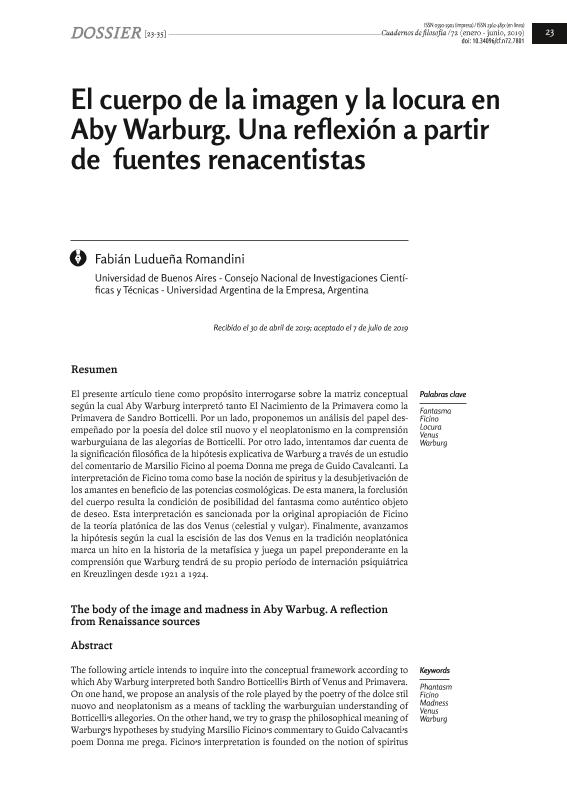Mostrar el registro sencillo del ítem
dc.contributor.author
Ludueña, Fabian Javier

dc.date.available
2022-09-09T20:23:00Z
dc.date.issued
2019-04
dc.identifier.citation
Ludueña, Fabian Javier; El cuerpo de la imagen y la locura en Aby Warburg: una reflexión a partir de fuentes renacentistas; Universidad de Buenos Aires. Facultad de Filosofía y Letras; Cuadernos de Filosofía; 72; 4-2019; 23-35
dc.identifier.issn
2362-485X
dc.identifier.uri
http://hdl.handle.net/11336/168230
dc.description.abstract
El presente artículo tiene como propósito interrogarse sobre la matriz conceptual según la cual Aby Warburg interpretó tanto El Nacimiento de la Primavera como la Primavera de Sandro Botticelli. Por un lado, proponemos un análisis del papel desempeñado por la poesía del dolce stil nuovo y el neoplatonismo en la comprensión warburguiana de las alegorías de Botticelli. Por otro lado, intentamos dar cuenta de la significación filosófica de la hipótesis explicativa de Warburg a través de un estudio del comentario de Marsilio Ficino al poema Donna me prega de Guido Cavalcanti. La interpretación de Ficino toma como base la noción de spiritus y la desubjetivación de los amantes en beneficio de las potencias cosmológicas. De esta manera, la forclusión del cuerpo resulta la condición de posibilidad del fantasma como auténtico objeto de deseo. Esta interpretación es sancionada por la original apropiación de Ficino de la teoría platónica de las dos Venus (celestial y vulgar). Finalmente, avanzamos la hipótesis según la cual la escisión de las dos Venus en la tradición neoplatónica marca un hito en la historia de la metafísica y juega un papel preponderante en la comprensión que Warburg tendrá de su propio período de internación psiquiátrica en Kreuzlingen desde 1921 a 1924.
dc.description.abstract
The following article intends to inquire into the conceptual framework according to which Aby Warburg interpreted both Sandro Botticelli’s Birth of Venus and Primavera. On one hand, we propose an analysis of the role played by the poetry of the dolce stil nuovo and neoplatonism as a means of tackling the warburguian understanding of Botticelli’s allegories. On the other hand, we try to grasp the philosophical meaning of Warburg’s hypotheses by studying Marsilio Ficino’s commentary to Guido Calvacanti’s poem Donna me prega. Ficino’s interpretation is founded on the notion of spiritus and the desubjectification of the lovers in favour of the cosmological forces. In this way, the foreclosure of the body is presented as the condition of possibility for the phantasm to become the authentic object of desire. This interpretation is sanctioned by Ficino’s original appropriation of the Platonic theory of the two Venuses (celestial and vulgar). Finally, we advance the hypothesis that the splitting between the two Venuses in the neoplatonic tradition is a landmark in the history of metaphysics and plays a fundamental role in the way that Warburg will understand his own period of psychiatric reclusion in Kreuzlingen since 1921 to 1924.
dc.format
application/pdf
dc.language.iso
spa
dc.publisher
Universidad de Buenos Aires. Facultad de Filosofía y Letras

dc.rights
info:eu-repo/semantics/openAccess
dc.rights.uri
https://creativecommons.org/licenses/by-sa/2.5/ar/
dc.subject
ABY WARBURG
dc.subject
MARSILIO FICINO
dc.subject
GUIDO CAVALCANTI
dc.subject
NEOPLATONISMO
dc.subject
FANTASMA
dc.subject
LOCURA
dc.subject
VENUS
dc.subject.classification
Otras Filosofía, Étnica y Religión

dc.subject.classification
Filosofía, Ética y Religión

dc.subject.classification
HUMANIDADES

dc.title
El cuerpo de la imagen y la locura en Aby Warburg: una reflexión a partir de fuentes renacentistas
dc.title
The body of the image and madness in Aby Warburg: a reflection from renaissance sources
dc.type
info:eu-repo/semantics/article
dc.type
info:ar-repo/semantics/artículo
dc.type
info:eu-repo/semantics/publishedVersion
dc.date.updated
2022-09-09T18:02:52Z
dc.journal.number
72
dc.journal.pagination
23-35
dc.journal.pais
Argentina

dc.journal.ciudad
Ciudad Autónoma de Buenos Aires
dc.description.fil
Fil: Ludueña, Fabian Javier. Consejo Nacional de Investigaciones Científicas y Técnicas; Argentina. Universidad de Buenos Aires. Facultad de Ciencias Sociales. Instituto de Investigaciones "Gino Germani"; Argentina. Universidad Argentina de la Empresa; Argentina
dc.journal.title
Cuadernos de Filosofía
dc.relation.alternativeid
info:eu-repo/semantics/altIdentifier/url/http://revistascientificas.filo.uba.ar/index.php/CdF/article/view/7801
dc.relation.alternativeid
info:eu-repo/semantics/altIdentifier/doi/https://doi.org/10.34096/cf.n72.7801
Archivos asociados
